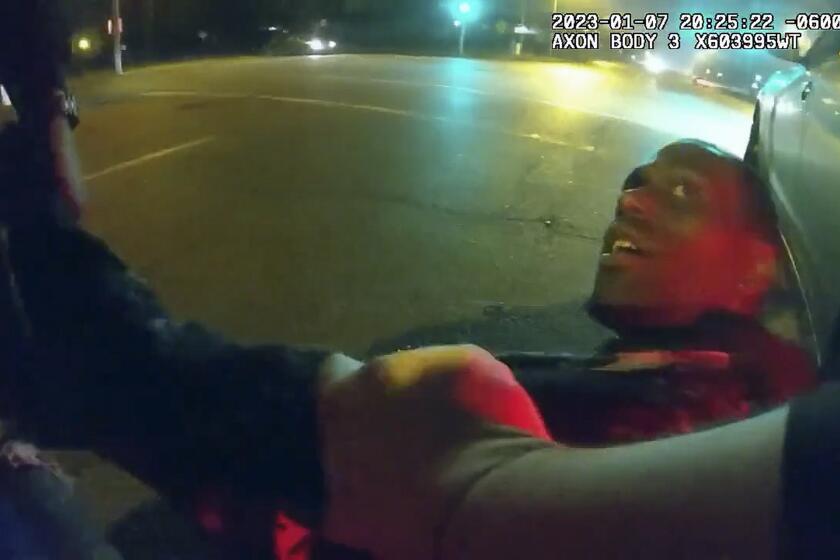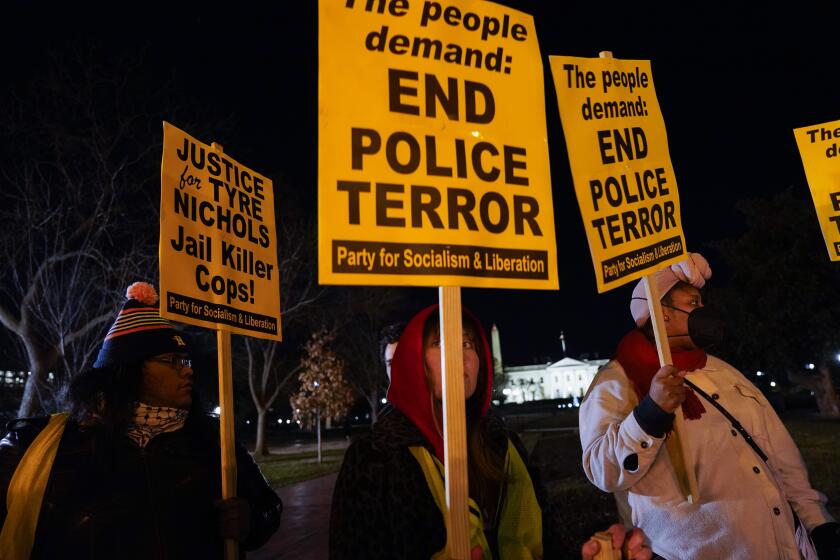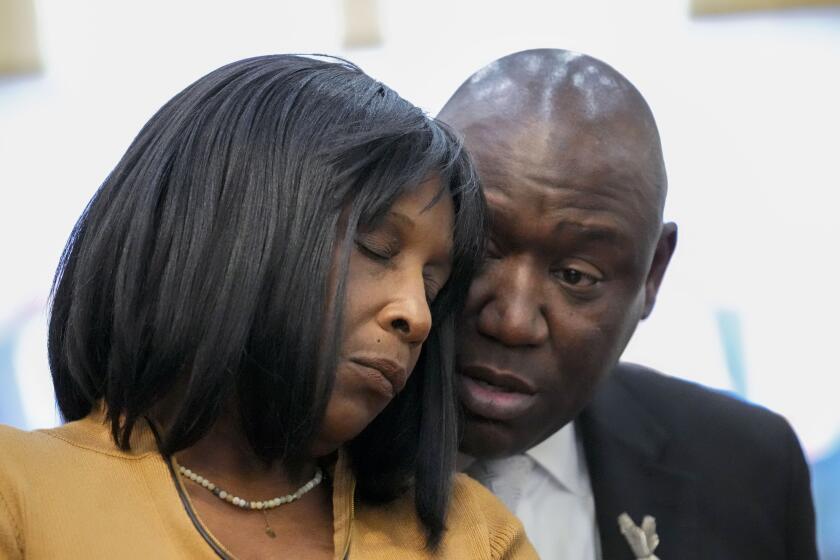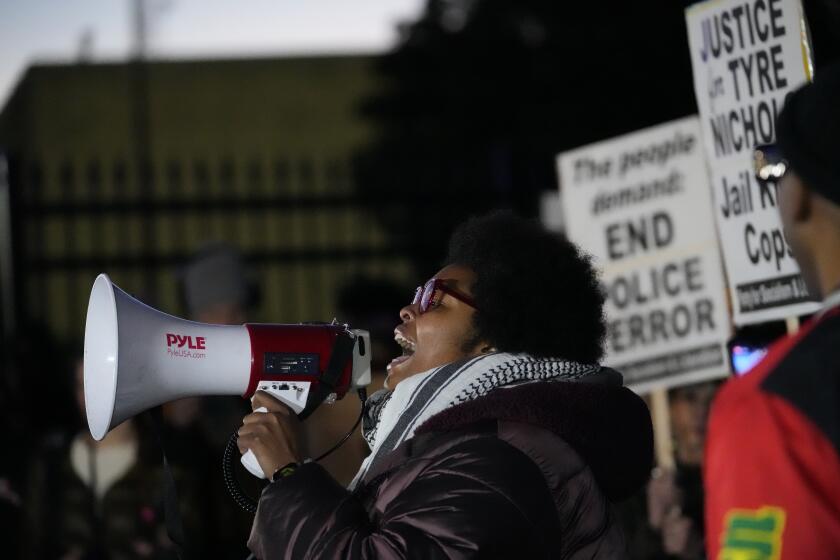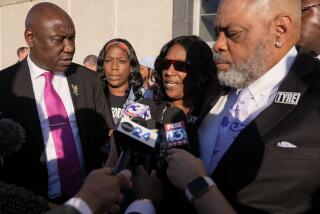Memphis officer never explained stop to Tyre Nichols
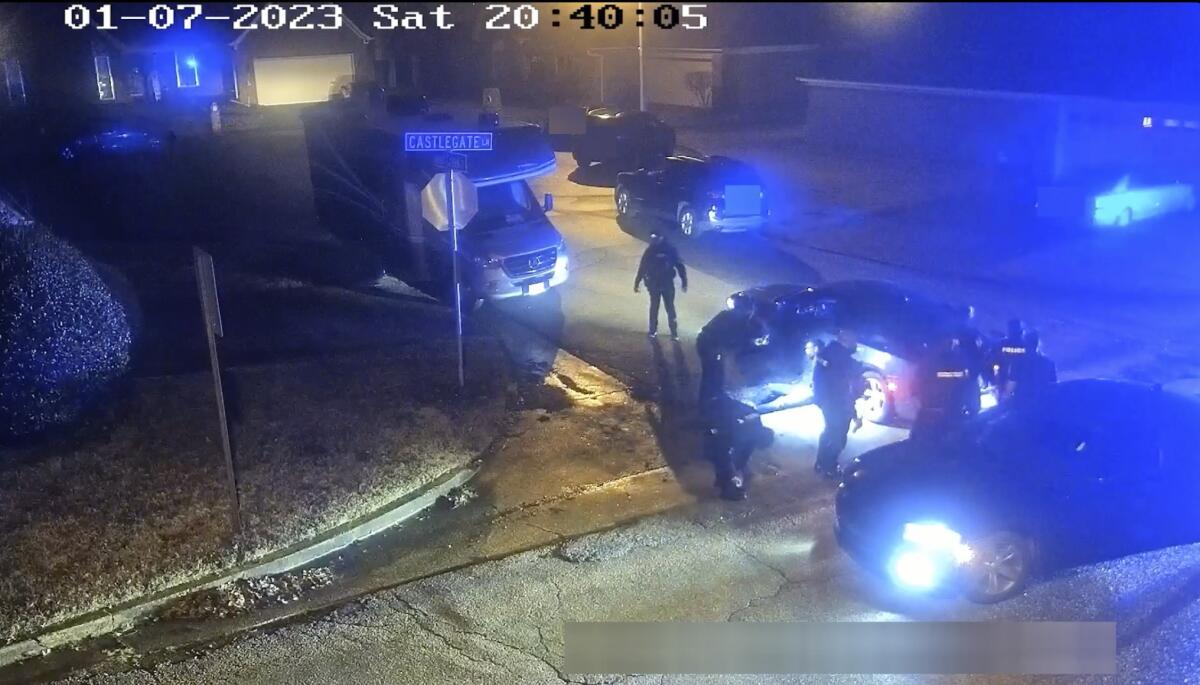
- Share via
MEMPHIS, Tenn. — The officer who pulled Tyre Nichols from his car before police fatally beat him never explained why he was being stopped, newly released documents show, and emerging reports from Memphis residents suggest that was common.
The Memphis Police Department blasted Demetrius Haley and four other officers as “blatantly unprofessional” and asked that they be stripped of the ability to work as police for their role in the Jan. 7 beating, according to documents released Tuesday by the Tennessee Peace Officers Standards and Training Commission.
They also include revelations that Haley took photographs of Nichols as he lay propped against a police car, then sent the photos to other officers and a female acquaintance.
Nichols died three days later — the latest police killing to prompt nationwide protests and an intense public conversation about how police treat Black residents.
Yet what led to it all remains a mystery.
The five officers — Haley, Desmond Mills Jr., Tadarrius Bean, Justin Smith and Emmitt Martin III — have been fired and charged with second-degree murder. The new documents offer the most detailed account to date of those officers’ actions. Their attorneys have not commented to the Associated Press about the documents.
The Memphis police chief has disbanded the city’s Scorpion unit after video was released of its officers beating Tyre Nichols to death.
Another officer also has been fired and a seventh suspended of duty. Six others could be disciplined, officials disclosed, without providing any details. That would bring the total involved to 13.
Erica Williams, a spokeswoman for the top prosecutor in Memphis, said more charges could still be filed.
Meanwhile, other residents are coming forward about interactions with Memphis police.
A federal lawsuit filed Tuesday accuses the same officers now charged with murdering Nichols, 29, with also violating the rights of another man from the same neighborhood as Nichols during a similarly violent arrest three days before Nichols’ arrest.
According to the lawsuit, Monterrious Harris, 22, was visiting a cousin at an apartment on the evening of Jan. 4 when his car was “suddenly swarmed by a large group of assailants wearing black ski-masks, dressed in black clothing, brandishing guns, other weapons, hurling expletives and making threats to end his life if he did not exit his car.”
Harris thought the men were trying to rob him, the lawsuit says, and he tried to back up his car before hitting something. He then reluctantly exited with his hands raised and was “grabbed, punched, kicked and assaulted” for up to two minutes, the complaint states. The beating stopped only after people came out of their apartments to see what was happening, the lawsuit alleges.
With five Black officers charged with murder in the beating death of Black motorist Tyre Nichols, what do we know about the role race plays in policing?
Photos of Harris’ face taken after his release on bail about nine days later show thick scabs on his forehead and a healing black eye.
The suit accuses officers of fabricating evidence to support charges against Harris, including being a convicted felon in possession of a handgun, criminal trespass and evading arrest.
Also, a woman told WREG-TV that she tried to warn the Memphis Police Department about Haley after a Feb. 21, 2021, encounter. Kadejah Townes said she was returning a movie to a Redbox machine at a Walgreens when police responded to a false shooting call. Police initially told her she could leave, she said, but then officers stopped her when she put her car in reverse. Haley placed handcuffs on Townes so roughly that she feared her arm was dislocated, she said.
Her aunt recorded the encounter. Then police stopped her aunt and brother while they followed a squad car as it took Townes to a hospital. Townes said she was never charged with anything.
Haley’s disciplinary file showed that after Townes filed a complaint, he was written up for failing to fill out proper paperwork — not for use of force.
“I wasn’t surprised,” Townes told the TV station.
The city of Memphis, Tenn., has released the video footage of police officers beating Tyre Nichols after a traffic stop.
Police Chief Cerelyn “CJ” Davis signed requests seeking to prohibit the five charged officers from working in law enforcement again. The Tennessee Peace Officers Standards and Training Commission will decide later whether to do that.
Haley, who was driving an unmarked car and wearing a black hoodie, forced Nichols from his car using profanity, then sprayed him in the eyes with a chemical irritant, according to the documents released Tuesday.
“You never told the driver the purpose of the vehicle stop or that he was under arrest,” the documents state.
Haley did not have his body camera on when he stopped Nichols but was on a phone call with someone who overheard.
Nichols ran from officers but was caught again a few blocks away. At that point, Haley kicked him in the torso as three other officers were handcuffing him. Other officers kicked Nichols in the face, punched him or struck him with a baton.
Charges against the other officers include that they misled officials about what happened.
While the video of Nichols’ beating by five since-fired Memphis police officers racked up nearly 2 million views in less than 24 hours, some people say they’re refusing to watch the footage because it feels exploitive of Black grief.
Martin, for instance, claimed Nichols tried to snatch the officer’s gun from his holster after another officer forced him out of the vehicle, with Martin helping by grabbing Nichols’ wrist. However, video doesn’t corroborate the gun-grab claim, the documents say.
In a letter from Smith included in his file, he defended his conduct, stating that Nichols was “violent and would not comply.”
Audio from a body camera did not capture Nichols using profanity or making violent threats — instead, he appeared calm and polite in his comments to the officers.
The documents also highlight the failure to provide aid afterward, with Bean’s indifference to Nichols’ distress reported by a civilian who recorded video that has not been released.
All five also were faulted for violating rules on body cameras — either by not having them on the whole time or by taking off their vests with cameras attached, the documents say.
Associated Press reporters Kimberlee Kruesi in Nashville, Gene Johnson in Seattle, and Heather Hollingsworth in Mission, Kan., contributed. Mattise and Loller reported from Nashville.
More to Read
Sign up for Essential California
The most important California stories and recommendations in your inbox every morning.
You may occasionally receive promotional content from the Los Angeles Times.
